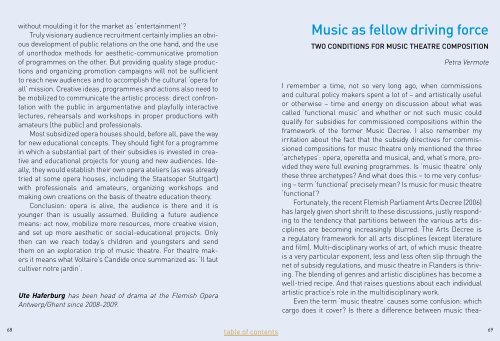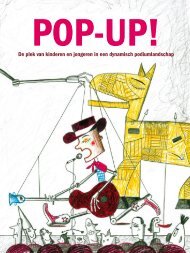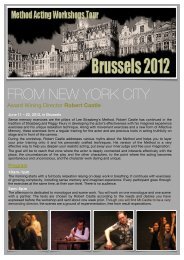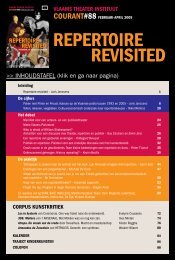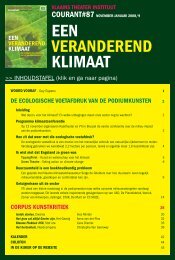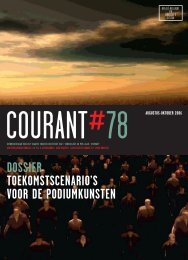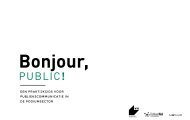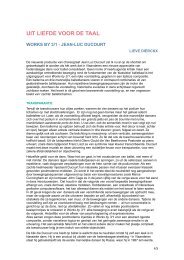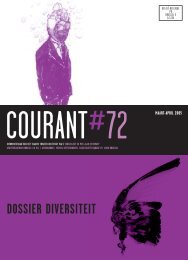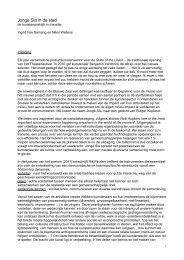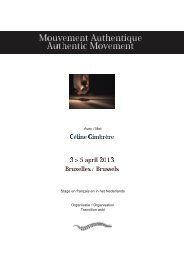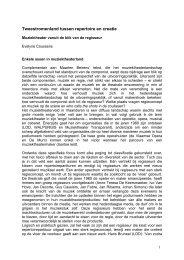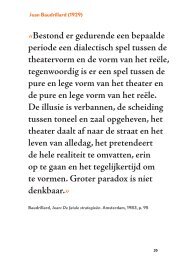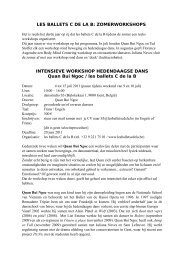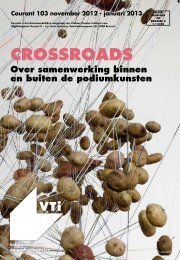music theatre in flanders - Muziekcentrum Vlaanderen
music theatre in flanders - Muziekcentrum Vlaanderen
music theatre in flanders - Muziekcentrum Vlaanderen
Create successful ePaper yourself
Turn your PDF publications into a flip-book with our unique Google optimized e-Paper software.
without mould<strong>in</strong>g it for the market as ‘enterta<strong>in</strong>ment’?<br />
Truly visionary audience recruitment certa<strong>in</strong>ly implies an obvious<br />
development of public relations on the one hand, and the use<br />
of unorthodox methods for aesthetic-communicative promotion<br />
of programmes on the other. But provid<strong>in</strong>g quality stage productions<br />
and organiz<strong>in</strong>g promotion campaigns will not be sufficient<br />
to reach new audiences and to accomplish the cultural ‘opera for<br />
all’ mission. Creative ideas, programmes and actions also need to<br />
be mobilized to communicate the artistic process: direct confrontation<br />
with the public <strong>in</strong> argumentative and playfully <strong>in</strong>teractive<br />
lectures, rehearsals and workshops <strong>in</strong> proper productions with<br />
amateurs (the public) and professionals.<br />
Most subsidized opera houses should, before all, pave the way<br />
for new educational concepts. They should fight for a programme<br />
<strong>in</strong> which a substantial part of their subsidies is <strong>in</strong>vested <strong>in</strong> creative<br />
and educational projects for young and new audiences. Ideally,<br />
they would establish their own opera ateliers (as was already<br />
tried at some opera houses, <strong>in</strong>clud<strong>in</strong>g the Staatsoper Stuttgart)<br />
with professionals and amateurs, organiz<strong>in</strong>g workshops and<br />
mak<strong>in</strong>g own creations on the basis of <strong>theatre</strong> education theory.<br />
Conclusion: opera is alive, the audience is there and it is<br />
younger than is usually assumed. Build<strong>in</strong>g a future audience<br />
means: act now, mobilize more resources, more creative vision,<br />
and set up more aesthetic or social-educational projects. Only<br />
then can we reach today’s children and youngsters and send<br />
them on an exploration trip of <strong>music</strong> <strong>theatre</strong>. For <strong>theatre</strong> makers<br />
it means what Voltaire’s Candide once summarized as: ‘Il faut<br />
cultiver notre jard<strong>in</strong>’.<br />
ute haferburg has been head of drama at the Flemish Opera<br />
Antwerp/Ghent s<strong>in</strong>ce 2008-2009.<br />
Music as fellow driv<strong>in</strong>g force<br />
TWo condITIons For MUsIc THeaTre coMPosITIon<br />
Petra Vermote<br />
I remember a time, not so very long ago, when commissions<br />
and cultural policy makers spent a lot of – and artistically useful<br />
or otherwise – time and energy on discussion about what was<br />
called ‘functional <strong>music</strong>’ and whether or not such <strong>music</strong> could<br />
qualify for subsidies for commissioned compositions with<strong>in</strong> the<br />
framework of the former Music Decree. I also remember my<br />
irritation about the fact that the subsidy directives for commissioned<br />
compositions for <strong>music</strong> <strong>theatre</strong> only mentioned the three<br />
‘archetypes’: opera, operetta and <strong>music</strong>al, and, what’s more, provided<br />
they were full even<strong>in</strong>g programmes. Is ‘<strong>music</strong> <strong>theatre</strong>’ only<br />
these three archetypes? And what does this – to me very confus<strong>in</strong>g<br />
– term ‘functional’ precisely mean? Is <strong>music</strong> for <strong>music</strong> <strong>theatre</strong><br />
‘functional’?<br />
Fortunately, the recent Flemish Parliament Arts Decree (2006)<br />
has largely given short shrift to these discussions, justly respond<strong>in</strong>g<br />
to the tendency that partitions between the various arts discipl<strong>in</strong>es<br />
are becom<strong>in</strong>g <strong>in</strong>creas<strong>in</strong>gly blurred. The Arts Decree is<br />
a regulatory framework for all arts discipl<strong>in</strong>es (except literature<br />
and film). Multi-discipl<strong>in</strong>ary works of art, of which <strong>music</strong> <strong>theatre</strong><br />
is a very particular exponent, less and less often slip through the<br />
net of subsidy regulations, and <strong>music</strong> <strong>theatre</strong> <strong>in</strong> Flanders is thriv<strong>in</strong>g.<br />
The blend<strong>in</strong>g of genres and artistic discipl<strong>in</strong>es has become a<br />
well-tried recipe. And that raises questions about each <strong>in</strong>dividual<br />
artistic practice’s role <strong>in</strong> the multidiscipl<strong>in</strong>ary work.<br />
Even the term ‘<strong>music</strong> <strong>theatre</strong>’ causes some confusion: which<br />
cargo does it cover? Is there a difference between <strong>music</strong> thea-<br />
68 69<br />
table of contents


